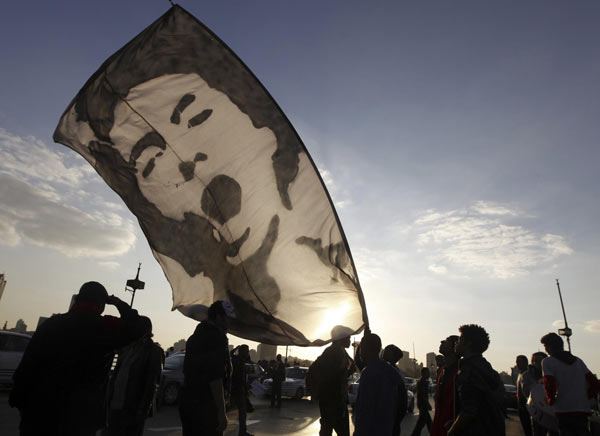Egyptians debate over draft law limiting protests
CAIRO - The draft law limiting protests in Egypt, which is currently being studied after recently being announced by Justice Minister Ahmed Mekki, stirred up an overwhelming debate in the Egyptian political arena.
 |
|
Anti-Morsi protesters and friends of youth activist Gaber Salah, also known as Gika, who died last month during clashes with riot police, shout slogans against Egypt's President Mohamed Morsi and the Muslim Brotherhood during the anniversary of his birthday with a flag bearing his image on the Qasr El Nile bridge near Tahrir Square in Cairo December 29, 2012. [Photo/Agencies] |
Contradictory reports emerged these days on whether the Shura Council, the country's temporary legislative authority, had received a proposed law to regulate demonstrations, sit-ins and strikes.
Mekki's statement made it clear that the intended law was not a ghost but a reality, even if it has not yet been submitted to the Shura Council for discussion.
Leaked reports said the controversial law specifies the time of protests from 7 am to 7 pm, regulating that protests can neither cause traffic jam nor include damage or sabotage and they cannot be held outside the presidential palace.
The proposed law also stipulates that strikes must be staged at least 14 days after prior notice and cannot affect work and production, which is seen as "ridiculous" by opposers of the law, as strike worldwide means halting production as a means of pressure.
Most political parties and movements in Egypt, including some Islamist ones, strongly rejected the draft law, arguing it limits freedom of expression and serves only the current administration.
The main opposition bloc dubbed "the National Salvation Front" denounced the law as "notorious," saying it represents a copy of the repressive laws adopted at the time of former President Hosni Mubarak.
"The Front, with its various political parties and revolutionary forces, will stand against this law and will take all necessary political and legal measures to hold protests against such a freedom-limiting law," Hussein Abdel-Ghani, the Front's spokesman, told Xinhua.
For his part, political activist and Front member Karima al- Hifnawi said the law "is an unforgivable crime against human rights. Whoever proposed this law is more evil than the devil as it prepares for a terrorist, repressive, fascist, police state."
Al-Hifnawi added that Egyptians broke the barrier of fear and held anti-government protests despite the emergency law during the time of Mubarak and they would not give up their right of expression under any circumstances.
The April 6 Movement, a well-known Egyptian movement that helped spark the upheaval that ended Mubarak's rule, condemned the intended law as a step back toward the Mubarak era.
"We as a movement had unique experience with Mubarak's police. In 2010, we sent the Interior Ministry an official notice through a police station that we intended to hold a demonstration. The result was that 100 of our members were arrested," Mohamed Adel, member of the movement, told Xinhua, rejecting any law stipulating prior notice beforehand.
Adel added that the Muslim Brotherhood (MB), the main supporter of President Mohamed Morsi, used to defend the right of expression and demonstration during the time of Mubarak, but now they call for limiting anti-Morsi protests.
The proposed law seems to be supported by Islamists, particularly the MB who denounces the nationwide protests intended by opposition on January 25 against Morsi and his Islamist supporters.
Still, moderate Islamist parties including Al-Wasat (Moderation) Party voiced rejection to the intended law "due to its timing and content," stressing that the government and the legislative authority should rather be busy with vital decisive issues in Egypt's history, such as limiting minimum and maximum wages, resolving unemployment, improving health-care, among others.
However, MB leaders declined to talk much about the proposed law, arguing that it had not yet come into being.
"The law regulating demonstrations hasn't yet been officially presented and I have not seen its details to comment on it," MB spokesman Mahmoud Ghazlan told Xinhua.
For his part, MB lawyer Abdel-Moneim Abdel-Maqsood, who is also a member of the National Council for Human Rights, rejected claims that his group urged this law to protect presidency from the nationwide anti-Morsi protests intended on January 25, stressing that the MB and other Islamists themselves would hold demonstrations on January 25 to mark the second anniversary of toppling Mubarak with nationwide protests.




























